#hebrew gospel of matthew
Text
John the Baptist's Wilderness Vegetarian Diet Explained - Spiritual Awakening Radio Podcast
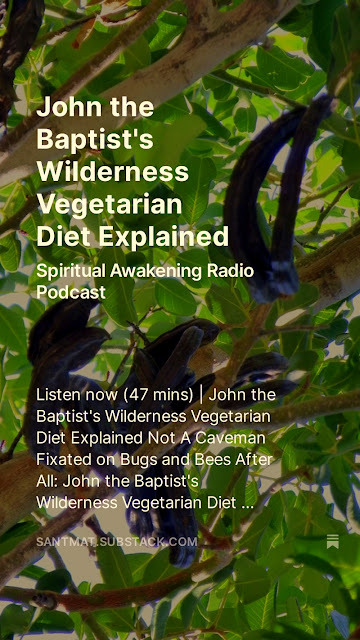
Not A Caveman Fixated on Bugs and Bees After All: John the Baptist's Wilderness Vegetarian Diet - Locust Beans Not Bugs - An Exploration of Early Christian Writings and Scholarly Texts Today on This Spiritual Awakening Radio Podcast.
Nevermind the old Sunday school notion of John the Baptist being some weird caveman dude dining on bugs! John may have a tarnished caveman reputation of eating locusts and honey out in the wild, but this is really a story about copyists mistranslating a Greek word as "locust" ('a-k-r-i-d-e-s') instead of "carob" ('e-g-k-r-i-d-e-s'). (Henry Ford: "Anyone who stops learning is old, whether at twenty or eighty. Anyone who keeps learning stays young." Albert Einstein: "Intellectual growth should commence at birth and cease only at death.")
Since my original research on this topic, a couple more early Christian apocryphal writings have come to light, have been made available in English. These add to the surprisingly large collection of vegetarian references in early Christian writings regarding the diet of John the Baptist. New Testament Apocrypha, Vol. III, by Tony Burke was published and some John the Baptist books are included. In one of the earlier volumes there was a John the Baptist text made available for the first time in English that has a vegetarian passage regarding John's diet in the wilderness. Included in the third volume are, The Birth of Holy John the Forerunner, and, The Decapitation of John the Forerunner, both containing plant-based passages about John's diet consisting of "locusts from the tree" (in the Middle east called "the Saint John's Tree", and "Carob Tree") and "wild honey", also "an abundance of bread and wild honey dripping from a rock". Clearly there was an understanding in early Christianity that this was referring to locust beans (carob pods), not insects. Carob pods do look a bit like locusts hanging from tree branches, hence the name. Locust beans can be ground up and used to make a kind of Middle eastern carob flour flat bread. There's a "cakes dipped in honey" reference in the Gospel of the Ebionites. The wild "honey" was not from bees but sticky desert fruit of some kind. So, as you'll hear being documented during this pod...cast, there are all these plant-based references to John's diet coming from many different sources, and scholars have noticed and discussed these: "Probably the most interesting of the changes from the familiar New Testament accounts of Jesus comes in the Gospel of the Ebionites description of John the Baptist, who, evidently, like his successor Jesus, maintained a strictly vegetarian cuisine." (Professor Bart Ehrman, Lost Christianities: The Battles for Scripture and the Faiths We Never Knew) "His [John the Baptist's] food was wild honey that tasted like manna, like a cake cooked in olive oil." (The Other Gospels, Accounts of Jesus from Outside the New Testament, by Bart Ehrman)
John the Baptist was a prophet with large number of followers in Israel and Transjordan regions. After his passing, several of his successors headed what became various rival Nasoraean (Nazorean) sects, one of those being Jesus and the Jesus movement. "Again Jesus said to his disciples: Truly I say to you, among all those born of women none has arisen greater than John the Baptizer." (Matthew 11:11, George Howard's translation of Shem-Tob's Hebrew Gospel of Matthew, described as "the oldest extant Hebrew version of the Gospel of Matthew")
John the Baptist's Wilderness Vegetarian Diet Explained - Spiritual Awakening Radio Podcast - Listen and/or Direct MP3 Download @:
https://traffic.libsyn.com/spiritualawakeningradio/John_the_Baptists_Wilderness_Vegetarian_Diet_Explained.mp3
@ the Podcast Website With Buttons That Go To All the Popular Podcast APPS - Wherever You Follow Podcasts:
https://SpiritualAwakeningRadio.libsyn.com/john-the-baptists-wilderness-vegetarian-diet-explained
@ Apple Podcasts:
https://podcasts.apple.com/us/podcast/john-the-baptists-wilderness-vegetarian-diet-explained/id1477577384?i=1000635517078
@ Spotify:
https://open.spotify.com/episode/0lMU46P0Tm9uugwN7IRgC5
@ Audible:
https://www.amazon.com/Spiritual-Awakening-Radio/dp/B08K561DZJ
@ Google Podcasts:
https://podcasts.google.com/search/spiritual%20awakening%20radio
& @ Wherever You Subscribe and Follow Podcasts - At Your Favorite Podcast APP Just Do a Search for "Spiritual Awakening Radio" - (Apple Podcasts, Spotify, Google Podcasts, Amazon, Audible, PodBean, Podcast APP, Overcast, Jio Saavan, iHeart Radio, Podcast Addict, CastBox, etc...):
https://linktr.ee/SpiritualAwakeningRadio
May the Blessings Be,
James Bean
Spiritual Awakening Radio Podcasts
Sant Mat Satsang Podcasts
Sant Mat Radhasoami
A Satsang Without Walls
https://www.SpiritualAwakeningRadio.com
#prayer of thanksgiving#go vegan#vegan thanksgiving#john the baptist#new testament apocrypha#vegan#veg#veganism#vegan christian#christian mysticism#christian mystics#vegetarian christians#early christianity#john the baptizer#gospel of matthew#gospel of the ebionites#gospel of the hebrews#hebrew gospel of matthew#jesus#vegan jesus#happy vegan thanksgiving#spiritual awakening radio podcasts
13 notes
·
View notes
Text

The Visit of the Magi
1 Now when Yeshua was born in Beit-Lechem of Yehudah in the days of Herod the king, behold, wise men from the east came to Yerushalayim, saying,
2 "Where is he who is born King of the Yehudim? For we saw his star in the east, and have come to worship him."
3 When Herod the king heard it, he was troubled, and all Yerushalayim with him.
4 Gathering together all the chief Kohanim and Sofrim of the people, he asked them where the Messiah would be born.
5 They said to him, "In Beit-Lechem of Yehudah, for thus it is written through the prophet,
6 'You Beit-Lechem, land of Yehudah, Are in no way least among the princes of Yehudah: For out of you shall come forth a governor, Who shall shepherd my people, Yisra'el.'"
7 Then Herod secretly called the wise men, and learned from them exactly what time the star appeared.
8 He sent them to Beit-Lechem, and said, "Go and search diligently for the young child. When you have found him, bring me word, so that I also may come and worship him."
9 They, having heard the king, went their way; and behold, the star, which they saw in the east, went before them, until it came and stood over where the young child was.
10 When they saw the star, they rejoiced with exceedingly great joy.
11 They came into the house and saw the young child with Miryam, his mother, and they fell down and worshiped him. Opening their treasures, they offered to him gifts: gold, frankincense, and myrrh.
12 Being warned in a dream that they shouldn't return to Herod, they went back to their own country another way.
— Matthew 2:1-12 | Hebrew Names Version (HNV)
The Hebrew Names Version Bible is in the public domain.
Cross References: Genesis 41:8; Numbers 24:17; Judges 17:7; 1 Chronicles 5:2; Ezra 2:21; Job 33:15-16; Song of Solomon 3:6; Isaiah 60:6; Jeremiah 23:5; Matthew 1:20; Matthew 2:16; Matthew 24:6; Mark 13:7; John 7:42; Acts 24:22
#birth of Jesus#star#pilgrimage of the Magi#Herod deceived#dream#warning#Matthew 2:1-12#Gospel of Matthew#New Testament#HNV#Hebrew Names Version Bible
17 notes
·
View notes
Text
Right Remembering
The system of sacrifices centered in the tabernacle or the temple had been trying to show us something. But they were only shadows. Jesus showed us the Reality that would help us remember correctly what He did for us.
Listen to the podcast of this post by clicking on the player below, and you can also subscribe on Apple, Spotify, or Audible.
https://craigtowens.com/wp-content/uploads/2024/03/right-remembering.mp3
Jesus hung on the Cross for about 6 hours. He was mostly silent during this time—His seven statements from the Cross would have taken less than a minute to say them all back-to-back.
He hung…
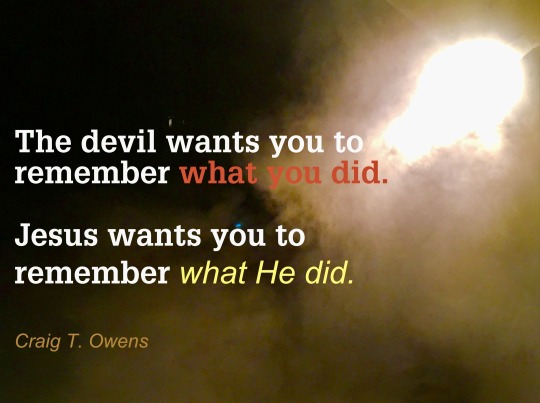
View On WordPress
#Calvary Assembly of God#Colossians#Communion#Cross#fulfilment#Good Friday#Gospel of John#Gospel of Luke#Gospel of Mark#Gospel of Matthew#Hebrews#Jeremiah#Jesus Christ#Last Supper#Passover#sacrifice#sermon#video
2 notes
·
View notes
Text
What was the Star of Bethlehem? - Historic Mysteries
What was the Star of Bethlehem? – Historic Mysteries
https://www.historicmysteries.com/star-of-bethlehem/

View On WordPress
#Angels#Animals#Book of Matthew#Christianity#Christmas#Frankincense#Gold#Gospel of Matthew#Hebrews#Herod the Great#Jesus#Jewish#Jews#Judaism#Judea#King Herod#Magi#Myrrh#New Testament#Shepherds#Star of Bethlehem
2 notes
·
View notes
Text
Church notes - April 2024
On LiveJournal: https://fardell24.livejournal.com/611671.html?newpost
On Dreamwidth: https://fardell24.dreamwidth.org/842306.html
#church#gospel of matthew#hebrews 10#matthew 19#philippians#philippians 2#philippians 3#philippians 4#psalm 24#psalm 63
0 notes
Text
To follow up on my Hosanna poll, I think before things go any further, it'd be good to actually explain and define it. I was initially going to wait until the end of the poll, but it seems that google is giving people a lot of bad and/or conflicting answers and I'd rather people walk away with the correct information.
So! Hosanna is an anglicized version of the Hebrew words "hosha na" [הושע נא or as a contraction הושענא]. Hosha na is a little enigmatic and hard to translate, but the simplest translation is probably "save us, please." It's traditionally used as an exclamation to G-d to rescue us, but it also has shades of being a triumphant shout (the implication being confidence that G-d will save us.)
Jews say "hoshanot" (the plural of hosha na) as part of our traditional Sukkot liturgy, and is something we do still today.
For us, the multi-faceted meaning of the root word allows us to have multiple layers of meaning. During Sukkot, we start praying for rain in its proper season and amounts, and we shake the lulav and etrog as part of these processions and liturgy. On Hoshana Rabba [the "great hoshana"], the last day of Sukkot, we process around the bimah (front lectern) seven times as a completion of our season of repentance and our starting of the new year with abundant blessings.
My siddur (prayer book) Lev Shalem has this as an explanation and translation:
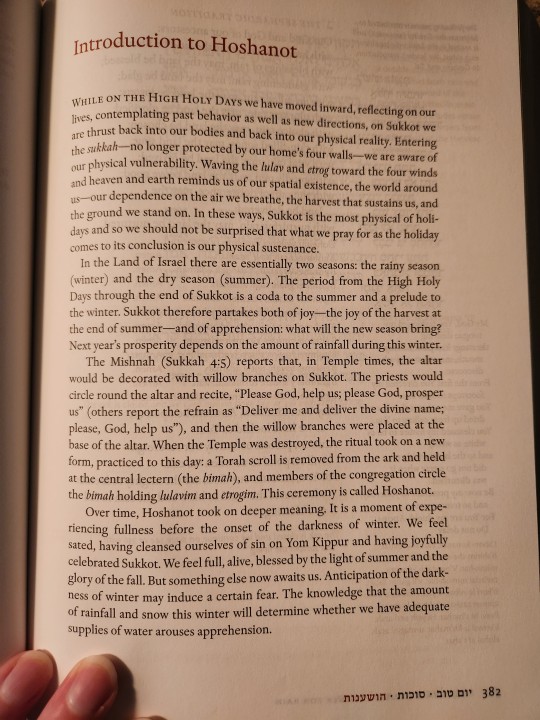
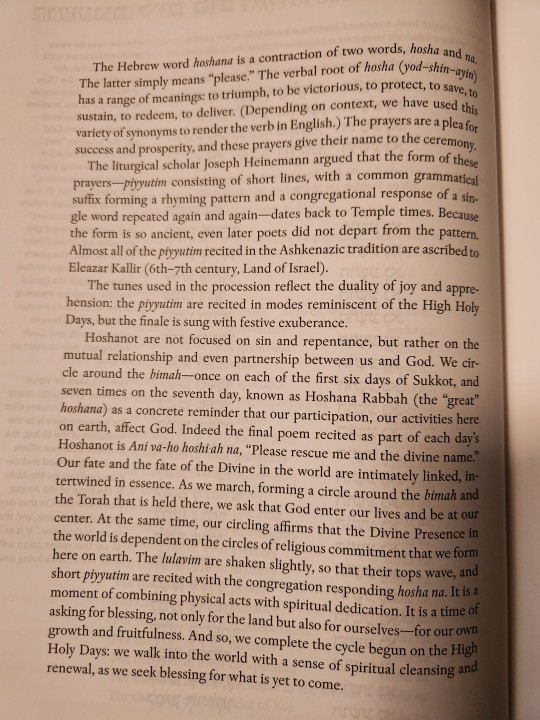
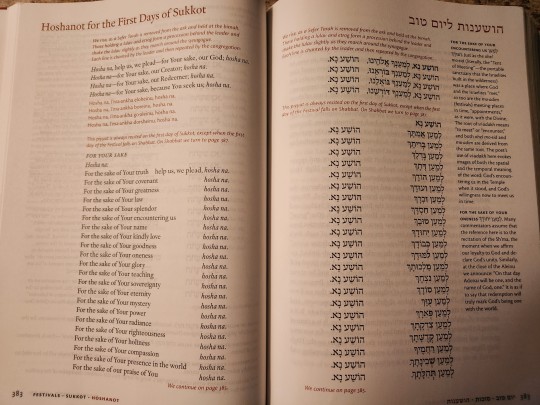
[Image ID is of the Lev Shalem siddur, pages 382 & 383 - I tried hard to find a pdf of this that would be readable using a screen reader, but the versions I'm finding cut off at pg. 376 at the latest. If anyone has bandwidth to type this up, I would greatly appreciate it]
For the curious, here is a recording of the Hoshanot liturgy and procession:
youtube
Christians mostly know the word from the gospels and hymns.
Here is what Wikipedia says about its use in Christianity:
Historical meaning
Since those welcoming Jesus were Jewish, as of course Jesus himself was, some would interpret the cry of "Hosanna" on the entry of Jesus in its proper meaning, as a cry by the people for salvation and rescue.
Christian reinterpretation
"Hosanna" many interpret as a shout of praise or adoration made in recognition of the messiahship of Jesus on his entry into Jerusalem
It is applied in numerous verses of the New Testament, including "Hosanna! blessed is the one who comes in the name of the Lᴏʀᴅ!" (Matthew 21:9,15; Mark 11:9–10; John 12:13), which forms part of the Sanctus prayer; "hosanna in the highest" (Mark 11.10); and "hosanna to the Son of David" (Matt 21:9). These quotations, however, are of words in the Jewish Psalm 118. Although not used in the book of Luke, the testimony of Jesus' entry into Jerusalem is recorded in Luke 19.
In church music
The "Hosanna Anthem", based on the phrase Hosanna, is a traditional Moravian Church anthem written by Bishop Christian Gregor of Herrnhut sung on Palm Sunday and the first Sunday of Advent. It is antiphonal, i.e. a call-and-response song; traditionally, it is sung between the children and adult congregation, though it is not unheard of for it to be done in other ways, such as between choir and congregation, or played between trombone choirs.
The bottom line:
Jews and Christians have different connections, associations, and meanings attached to this word as expressions of our different theologies and texts. The word is derived from a Hebrew word and was created by Jews and is still used by us today. (Like literally today - we are currently in the middle of the Sukkot festival.) Christians changed the meaning to fit within their own context, and pronunciation of the word evolved with linguistic drift over time. In the same way that there's not a reason to pitch a fit over saying Jesus rather than Yeshua, there's no compelling reason to change hosanna back to hosha na; if anything, the distinction helps make it clear that it's effectively a different word and concept from ours.
On the other hand, I do think Christians ought to know the original meaning of the word if they're going to use it. To only ever know their version when it was derived from ours is yet another small way of playing into supercessionism by erasing and replacing the Jewish context of things that were originated in Judaism that Christians have embedded in Christianity. While the Christians of today cannot unwind the supercessionism of Christian history, they *can* choose to understand their present Christianity in ways that do not play into supercessionism and that respect the Jewish community of today.
I hope this was helpful and gives folks a new perspective on an obscure Hebrew word!
472 notes
·
View notes
Text

2 Timothy 3:14-17 (NIV). “But as for you, continue in what you have learned and have become convinced of, because you know those from whom you learned it, and how from infancy you have known the Holy Scriptures, which are able to make you wise for salvation through faith in Christ Jesus. All Scripture is God-breathed and is useful for teaching, rebuking, correcting and training in righteousness, so that the servant of God may be thoroughly equipped for every good work.”
Hebrews 4:12 (ESV). “For the word of God is living and active, sharper than any two-edged sword, piercing to the division of soul and of spirit, of joints and of marrow, and discerning the thoughts and intentions of the heart.”
“The Question of Inerrancy” by In Touch Ministries:
“Do you believe that all of the Bible is true?”
“Have you ever wondered about the supposed inconsistencies critics point out in the Bible? Such things might leave you questioning how to tell what’s truly God’s Word and what isn’t. The answer is simple: God is the final authority. The Sovereign of the universe had no trouble keeping His Word pure. As 2 Timothy 3:16 says, “All Scripture is inspired by God and beneficial.”
Reading the Bible as a whole document reveals that each part is consistent with every other. God allowed for writers’ differences in viewpoint and background, which at times can give the appearance of discrepancy. But further study always reveals how the various parts fit together. Consider, for example, the gospels’ different angles on a story. Writing to Jewish people, Matthew emphasizes history and the fulfillment of messianic prophecy. John tells a love story about a Savior willing to die for the world. While both authors traveled in Jesus’ company, their perspectives differed. Yet in the fundamentals, they and the other two writers are consistent.
It is critical for believers to trust in the inerrancy of the Scriptures. A flawed book could only be the product of man’s hand, but the Bible is the authoritative Word of God. His Spirit did the talking, no matter whose hand wrote the message.”
#2 timothy 3:14-17#hebrews 4:12#god loves you#bible verses#bible truths#bible scriptures#bible quotes#bible study#studying the bible#the word of god#christian devotionals#daily devotions#bible#christian blog#god#belief in god#faith in god#jesus#belief in jesus#faith in jesus#christian prayer#christian life#christian living#christian faith#christian inspiration#christian encouragement#christian motivation#christianity#christian quotes#in touch ministries
75 notes
·
View notes
Text
Last notes and final thoughts on Creating the Quran:
A text does not become fixed at its first writing; ancient and especially sacred writing remain open and in flux for a considerable period after. Even after it was written down, the Quran was a text "in process."
The rasm (the consonantal "skeleton" of the Quran) does show extraordinary constancy from the time of Abd al-Malik; its vocalization was in dispute for centuries after. But the tremendous fluidity of the oral phase of development did come to an end.
Lol, the name of a scholar cited in this chapter is "Assmann."
Oral tradition can coexist with a written canon for a time: even once the Gospels had been written down, ancient writers rarely cited them word-for-word, often using relatively free transmissions and maintaining the vibracy of oral tradition. A similar process may have been at work around the Quran.
Sometimes searching for an "original text" when it comes to texts like these (including the Gospels, for instance, or the books of the Hebrew Bible) may even be meaningless; the early text-forms are in dialogue with the late oral-forms, and the former are not being produced with the specific end of creating a fixed, canonical text. Concepts like individual authorship, a complete and self-contained textual artifact, and formal publication don't necessarily apply. Canonized texts can start out as essentially aids to memory, or personal notes, that existed to be revised and extended as necessary.
The early regional codices could have grown out of such memoranda, only gradually being reshaped into more complete and polished texts. This would help account for why the Quran often repeats the same tradition in different forms, sometimes with minor differences and sometimes with significant contraditions.
For works like the Gospels, Matthew and Mark might have even been regarded as functionally "the same text" in the same way even very different oral performances of a story can be considered "the same."
The evident parallel traditions in the Quran may derive from the retelling and recomposition of traditions in different communities, or from ongoing revisions to an open text. Many of these parallel traditions are Christian ones, or Jewish ones that seemed to enter the text from Christian sources.
Extensive biographical tradition within Islam around Muhammad in particular; but it's unlikely (for reasons discussed earlier) to be reliable. The small grains of historicity within it are obscured by the narrative that has grown around them.
Some traditions in the Quran appear to originate from before Muhammad's prophetic mission, distinguished by their utter lack of intelligibility for early Muslim commentators. This indicates they were not passed down orally, since they were not altered in ways to make them relevant to the community, and so may have been written down when Muhammad and his earliest followers encountered them.
Bellamy argues there are more than two hundred words in the Quran that later commentators not only didn't understand, but didn't know how to vocalize. These could be the result of copyists' mistakes, but they're present in all Quran manuscripts, and so would have to go back to a single version.
Example: "Yuhanna" ("John") being read as "Yahya," because of the ambiguity between and without consonant-pointing. With just the rasm, Yahya is a perfectly good guess--whoever first read "Yahya" in the passages where it occurs cannot have had an oral tradition preserving the sound of the name, or prior knowledge of John the Baptist, or they would have recognized it on the basis of context.
Surat Quraysh was very opaque to interpreters, who had no better understanding of this sura than we do today; the meaning of the key term "ilaf" seems to be entirely opaque, leading to a wide array of interpretations. Difficult to reconcile this lack of understanding with Muhammad teaching it to his followers.
Final editing of the Quran must have been very conservative to retain these infelicities--typical of scriptural traditions, or at least of the Hebrew Bible and New Testament.
Patricia Crone proposes some parts of the Quran predate Muhammad. Michael Cook says OTOH maybe the materials that make up the Quran didn't become "generally available as scripture" until well after Muhammad's death. Neither supposition is exclusive of the other.
Gerd Puin argues that "every fifth sentence" or so "simply doesn't make sense." Gerald Hawting observes "the text taken on its own is often completely unintelligible, filled with grammatical and logical discontinuities." This puts me in mind with the weird way different sources are jammed together in the Hebrew Bible, sometimes totally muddling narratives that were clear in the original--I don't wonder if part of the problem is that different regional codices, when brought together, were harmonized in a very conservative way that left a lot of contraditions and discontinuities in the text.
Shoemaker thinks the best model is still the one where the Quran is largely rooted in Muhammad's teachings, with the inclusion possibly of some archaic and imperfectly understood textual materials, and with considerable change introduced in the process of transmission before final canonization.
Quran talks about seafaring and fishing familiarly, both things alien to Mecca and Yathrib. Ditto agriculture and vegetation, especially kinds not found even in the Yathrib oasis. Most likely elements that found their way in once the Islamic polity had reached the shores of the Mediterranean.
Similarly out of place geographical references: Sodom and Gomorrah as places passed by daily; as the audience living not far from where Lot once dwelled. Landscape of memory here is focused on Palestine, not Hijaz.
Heavy borrowing of words, including from Syriac and Hebrew, in the language of the Quran, indicating heavy linguistic contact with the Fertile Crescent.
"Vast knowledge of Christian lore" despite no Christian presence in Mecca or Yathrib, in either the Islamic tradition or elsewhere. Quran assumes good knowledge of the Torah and Gospels and many extrabiblical traditions also. The Quran's presentation of many figures from the Hebrew Bible draws specifically on Syriac Christian traditions, and not on Jewish traditions as you might suppose from the traditional account of Jews present in Medina. Its anti-Jewish rhetoric and demonology depend on earlier Christian traditions, and some passages seem to address Christian directly.
Removing Muhammad and the Quran completely from the Hijaz would make it hard to explain why Mecca and Yathrib eventually came to be so important in later tradition. It seems likely that, even though the Holy Land and Jerusalem stood at the center of the imagination of early believers, there was some historical connection to the Hijaz, and only as they began to more self-consciously differentiate themselves from Christians and Jews around them did they shift their focus to this element of their history.
It's not necessary (or tenable) to entirely detach the Quran from the figure of Muhammad. Some material in it almost certainly derives from his prophetic career in Mecca and Medina. In some cases, followers later added blocks of textual material already written down in a religious context somewhere outside the Hijaz, alongside entirely new traditions emerging from cross-cultural contact.
19:22-28 gives a compressed account of the Nativity that is found only in the liturgical practice of a particular Marian shrine just outside Jerusalem, the Kathisma church. This tradition is so obscure it's unlikely it independently made its way to the central Hijaz--it joined the corpus most likely after Muhammad's followers took control of the region, and converted this church into a mosque.
Like almost all other sacred texts of its type, the Quran is not a "book" but a corpus: texts not originally intended to be grouped together, heterogenous in origin and function, and in some cases dependent or independent of one another. Composite, but also composed, i.e., put together intentionally and carefully using techniques from a literate context, with literary polish.
70 notes
·
View notes
Note
i'm jewish and i'm not a fan of christian hegemony, but I'm also an ardent fan of messiah narratives in fiction, and i've recently rediscovered my love of the musical Godspell. if you have a moment, could you share a little about the historical context of the gospel according to matthew? i'm trying to work out my relationship to this piece of text as a historic document, even though i don't believe in it literally. what did contemporary thinkers make of it at the time? why did it have so much staying power?
though matthew is placed first among the synoptics in the second testament, it was written after mark (and after source q: a lost gospel from which both mt and luke took material). because of this late composition date (at least 30 years, but probably more, after jesus' death), matthew is concerned with an early jesus movement that has begun establishing itself. he writes to both jews and gentiles, and particularly because of this latter audience, he adds a great deal of description of hebrew bible and jewish terminology that otherwise is taken for granted in mark (and likely q, too). and yet, despite all these attempts to explain to gentiles the jewish tradition, matthew gets much wrong: he is likely new to the faith himself. what we have then is a gospel written by someone who had just entered the early jesus movement, for others in the same position. that is precisely why it has proved durative: the details, the additions, the teaching (bordering hand-holding). matthew's jesus is friendly, not-too-jewish, promising a kind of resurrection that the early jesus movement so desperately loved. his gospel, in turn, is lyrical, dripping with imagery and written in gorgeous prose. and yet, it is easy to read. didactic or, more appropriately, catechistic. jesus for dummies
#ask#i am not a nt scholar but i can read matthew and see all he gets wrong about the hebrew bible and thats all you need to know
22 notes
·
View notes
Text
Walking Away From The Truth: How Does Apostasy Happen?
As believers, we love Jesus, we follow Him, we’re all in. We’re so thankful for the gospel—for being transformed and given new life. So we don’t understand how anybody who’s tasted that could ever walk away from it. How does apostasy happen? I’ve discovered about thirty different reasons the Bible has for why it happens. Here are a few.
Number one, persecution. People just do not want to pay the price to follow Jesus, especially publicly. Popularity and other people’s opinions are just way too important to them. “If I made a big deal about Jesus publicly, it could hurt my business or my status in the community.”
In Jesus’ parable about the sower and the seed, there are different hearts of people who heard the message. Jesus said that when persecution or tribulation arises because of the Word, some fall away. They stumble (see Matthew 13:20-21).
Another reason is mixed devotion. Some people come to church, but they’re fence-sitters. They think, “I’m attracted to the Jesus who forgives me for my sins and gives me joy and purpose, but there’s a lot of fun stuff to do in this world.” They’re earthbound. They’re after momentary comfort rather than Jesus and discipleship.
The Bible says, “Do not love the world or the things in the world. If anyone loves the world, the love of the Father is not in him” (1 John 2:15). In the sower parable, Jesus said, “The cares of this world and the deceitfulness of riches choke the word, and he becomes unfruitful” (Matthew 13:22).
A third reason it can happen is because it’s just plain hard to follow Jesus for some—probably for all of us—at one point or another. Have you ever read something and thought, “I have to live that? That’s hard!” I certainly have.
When people heard Jesus’ sermon in John 6, it was a tough message to receive. They said, “This is [a] hard saying; who can hear it?” (John 6:60, KJV). And then we’re told, “From that time many of His disciples went back and walked with Him no more” (John 6:66). The demands were too difficult.
Another reason people apostatize is because they’re not paying attention. Sounds like something your teacher would say, right? But it’s possible to fall away because you’re not really grabbing hold of the truth. Hebrews 2:1 says, “Therefore we must give the more earnest heed to the things we have heard, lest we drift away.”
Another reason it can happen is laziness. Some people just aren’t interested in coming to church. They distance themselves from it because they don’t want that accountability of having other believers around them.
But Hebrews 10:25 says, “not forsaking the assembling of ourselves together, as is the manner of some, but exhorting one another, and so much the more as you see the Day approaching.”
These are just a few reasons. The Bible lists many more, including Satan’s devices, an unbelieving heart, a hardened heart, rebellion, bitterness, immorality, disrespect of leadership, not mixing God’s promises with faith.
In fact, the majority of those exposed to the Gospel will turn away from it. Look at the math from the parable of the sower and the seed. Of all the people that heard the truth, only twenty-five percent bore any kind of fruit, and a very small percentage bore what Jesus called hundred-fold fruit (see Matthew 13:23).
It’s no wonder that Jesus said, “Wide is the gate and broad is the way that leads to destruction…. Narrow is the gate…which leads to life, and there are few who find it” (Matthew 7:13-14). Not most, not a lot—few. No wonder Jesus will say to many, “I never knew you; depart from Me” (Matthew 7:23).
Skip Heitzig
30 notes
·
View notes
Text

♕ #AnneBoleynWeek by @anne-the-quene, Day 3 | Favourite Historical Fact(s) about Anne Boleyn ♕
♕ Anne was eager for her daughter, Princess Elizabeth, to learn Latin, Hebrew, Greek, Italian, Spanish, and French in her upcoming education. ♕
♕ "Anne was known as a protector of Tyndale's readers."
♕ "For her chaplains, ‘lanterns and light of my court’, she chose men won to reform: Matthew Parker, Robert Singleton, William Latimer, Nicholas Shaxton and others."
♕ The French ambassador Du Bellay reported that "none of the other [councillors] have any credit at all [with Henry VIII] unless it pleased the Young Lady to lend them some."
♕ She was a patron of Hans Holbein.
♕ She secured the release of, and later patronized, the poet and reformer Nicholas Bourbon as tutor for Henry Carey, Henry Norris (the Younger), Henry Dudley, and one of the sons of Nicholas Harvey.
♕ "Her London silkwomen, Anne Vaughan and Joan Wilkinson, were fervent gospellers."
♕ "The Act attainting Elizabeth Barton and her supporters of high treason pardoned all those not specifically named in the statute; the King made the decision at ‘the humble suit and contemplation of his most entire and well-beloved wife Queen Anne.’"
♕ "Richard Hilles lamented her loss in 1541 as one of the 'sincere ministers of the word’ who had been taken away.”
♕ "True to Christian humanism, she backed education, acting as a generous patron to students and giving annual subvention to Cambridge and Oxford."
♕ Anne was friends with Princess Renee of France in her youth.
♕ "Of ten bishops appointed during her time as Queen, seven were her own evangelical clients." ♕
#anneboleynweek#i am sooo late#anne boleyn#anneboleynedit#i will link to the rest of these later...#i wanted to include one about style/fashion and like quotes by nicholas bourbon but realized the latter was more applicable to the quote da#also this just got . way too long#so ps also that her style was unmatched
28 notes
·
View notes
Text
“The Hebrew word for soulmate is b'shert. A Jewish woman once explained to me that she understood the word to mean that one's soulmate is only visible to the person who is living in the will of God. You could live next door to him your whole life and never know it, unless you were living as God was calling you to live.
How do you conform your life to His will? In the Gospel of Matthew, our Lord says, "But seek first his kingdom and his righteousness, and all these things shall be yours as well” (Matthew 6:33). However human the temptation may be, we can't say, "Okay, God. If I need to put you first in my life in order to get what I want, then I hereby declare you first. Now can I have what I want?" It doesn't work like that.
Spiritual maturity emerges only through patient suffering. Seasons of waiting, wondering, and hoping may need to pass by as you cling to Him in faith, allowing Him to shape your hopes and even your very desires.”
-Jason and Crystalina Evert, How to Find Your Soulmate Without Losing Your Soul
#Christianity#love#relationships#dating#quotes#Christian marriage#Jason Evert#Crystalina Evert#How to Find Your Soulmate Without Losing Your Soul
17 notes
·
View notes
Photo

Shining In The Darkness
13 "You are the salt of the eretz, but if the salt has lost its flavor, with what will it be salted? It is then good for nothing, but to be cast out and trodden under the feet of men.
14 You are the light of the world. A city set on a hill can't be hidden.
15 Neither do you light a lamp, and put it under a measuring basket, but on a stand; and it shines to all who are in the house.
16 Even so, let your light shine before men; that they may see your good works, and glorify your Father who is in heaven.
— Matthew 5:13-16 | Hebrew Names Version (HNV)
The Hebrew Names Version Bible is in the public domain.
Cross References: Job 6:6; Proverbs 4:18; Zechariah 4:2; Matthew 9:8; Mark 4:21; Mark 9:50; Luke 8:16; John 8:12; John 15:8; 1 Peter 2:12
#salt#light#shine#good deeds#glorify#God the Father#Matthew 5:13-16#Gospel of Matthew#New Testament#HNV#Hebrew Names Version#Holy Bible
23 notes
·
View notes
Text
Prepared To Pass The Test
God lovingly prepares us for the tests and temptations we are going to face so that we will be victorious in them. This is what happened to Jesus and it’s how He wants us to pray.
Listen to the podcast of this post by clicking on the player below, and you can also subscribe on Apple, Spotify, or Audible.
https://craigtowens.files.wordpress.com/2024/02/prepared-to-pass-the-test.mp3
The prayer that Jesus taught His follower is a prayer for citizens of the Kingdom of Heaven. These are not just some magical words to pray whenever we don’t know what to pray.
We come to a…

View On WordPress
#1 Corinthians#Book of James#Calvary Assembly of God#Gospel of Luke#Gospel of Mark#Gospel of Matthew#Hebrews#Jesus Christ#Lord&039;s Prayer#preparation#Psalm#sermon#spiritual warfare#temptation#trials#video
2 notes
·
View notes
Text
Fyodor's Last Words in Bungou Stray Dogs
Hello! I know I've been saying I was gonna do this for a long time, and I really did try to find my notes quickly, but I'm here now. This post is meant as a Religious Studies Analysis. As such I would like to state that I was a dual major in Religious Studies and History to qualify myself for this discussion.
I am also going to be writing this post for accessibility, that is to say I am going to assume the reader has little to no knowledge about the New Testament so I will be explaining or giving context to a lot of things, even things that may seem obvious.
What Were Fyodor's Words?

Eli, Eli, Lema Sabachtani which as I'm sure you know is the Arameic version of Christ's cry to God as he was on the Cross in the Book of Matthew. The Book of Matthew is one of the four gospels in the New Testament. The Gospels (which translates to Good News) tell the life story of Jesus.
In the King James Version of the Bible these words are said, "And about the ninth hour Jesus cried with a loud voice, saying, Eli, Eli, lama sabachthani? that is to say, My God, my God, why hast thou forsaken me? (Matthew 27:46)
A disclaimer, I am using the King James Version of the Bible for its importance to the English Language. If you want to see Matthew 27:46 translated differently please check Bible Gateway.
The Significance of Matthew 27:46
Let's talk about the context of Matthew 27:46. Now, this line comes during the Crucifixion of Jesus. This was the ninth hour of Jesus being on the cross, or around 3 in the afternoon, and is said following a period of darkness from noon to three.
Now many scholars and theologians have tried to understand why Jesus would have said God had forsaken him, and this is the same for Fyodor too.
However, I would like to talk about Matthew 27:46 in the context of prophecy. Now, for many Christian scholars the Hebrew Bible (Old Testament) contain several prophecies which Jesus later fulfills. In Psalms 22:1 "Eli, Eli, lama sabachthani?" is said once again. Therefore, a popular interpretation of Matthew 27:46 is that Jesus is emphasizing how his death and eventual resurrection were all proclaimed long ago and fated to happen.
In short: the quote illustrates the prophetic nature of Jesus and how he is the Messiah.
And How Does Fyodor Connect?
Well, I believe that Fyodor's last words were a warning. A warning to Dazai that Fyodor knew he would "die" and come back, just as Jesus did when he said it on the cross. Maybe he planned this all out or views his life as some sort of prophecy to eliminate all ability users.
If we take the quote and apply the Psalms connection to it, it becomes evident that the "sacrifice" Fyodor took was fated to happen and he knew it. He knew he was going to come back, he possibly knew this was going to happen.
Moreover, this quote may also have something to do with his resurrection. Later in Matthew (Matthew 27:50-53), Jesus calls out and an earthquake happens, "and the graves were opened; and many bodies of the saints which slept arose." (Matthew 27:52). Right after Jesus calls out to God, the saints rise from the dead and go to heaven. The quote is intimately tied with resurrection, and I don't think that's a coincidence that Fyodor said it and then comes back. I think Asagiri took this into consideration too.
Most people would think that "My God, my God, why have you forsaken me?" would be a plea of a man caught in a trap with no way out. But, this interpretation does not make sense with Fyodor or his "death". Therefore, understanding Matthew 27:46 has both a line connected with the resurrection of saints and prophecy is crucial to understanding why Fyodor said it during the helicopter crash. He knew he was coming back. I think it was a warning and to illustrate how "ordained by God" his mission is. There's probably more context to add, but it's late and I am sleepy now.
I know this all kinda confirms what we already know, but I think it really illustrates the depth of Fyodor's planning and that he might have known how Mersault was going to go the whole time. Which is terrifying if you think about it.
As always feel free to add things, ask questions, etc. If you disagree just keep it civil. There's probably some things manga wise I didn't add so if you have things to add please do.

#bsd#bsd theory#bungou stray dogs#bungou stray dogs fyodor#bsd fyodor#bsd manga#bsd analysis#bsd religious studies analysis
14 notes
·
View notes
Text
Church notes - 27th August 2023
27th
Colossians 3:16
Ephesians 4:11 - 16
Challenge: Become like Jesus
Change our thinking, lifestyle and attitudes.
Romans 8:29
He wants us to become like Jesus
Our values and moral decisions to be like Jesus.
Fruit of the Spirit
Galatians 5:22, 23
Romans 5:3, 4
God is more interested in who you are, than what you do.
God uses troubles to teach us to trust Him.
God uses temptations to teach us to obey Him.
God uses trespasses to teach us to forgive.
Matthew 27:41 - 44
Four Habits of a Disciple
The habit of time in God's Word
The Habit of Prayer
The Habit of Tithing
The Habit of Fellowship
2 Timothy 3:16
James 1:22 - 25
Matthew 6:9 - 15
Start with praise of God
Committ to God's plan for your life
Our daily needs
Forgiveness
Protection
Tithing.
1 Corinthians 16:2
Fellowship.
Hebrews 10:24, 25
#1 corinthians#1 corinthians 16#2 timothy#2 timothy 3#church#colossians#colossians 3#ephesians#ephesians 4#galatians#galatians 5#gospel of matthew#hebrews 10#james 1#matthew 27#matthew 6#romans 8
0 notes